- Home
- Lauren Oliver
Vanishing Girls Page 10
Vanishing Girls Read online
Page 10
I haven’t been onstage since I was in second grade. And even that was a disaster. In our second-grade production of Chicken Little I completely forgot my cue—and then, in a desperate rush to make it out of the wings before the musical number ended—ran smack into Harold Liu and ended up knocking out one of his teeth.
I try to detach my arm from Alice’s grip, but she’s surprisingly strong. No wonder she scaled the Cobra this morning in five minutes flat. “Can’t you get Maude to do it?”
“Are you kidding? No way. She’ll terrorize the children. Come on, do it for me. It’ll be over before you know it.” She practically pushes me into the front office, which is empty. She skirts around the file cabinet and bends down to retrieve the mermaid costume from the corner, where it is folded neatly and sheathed in plastic after every performance. She removes it from its protective covering, shaking the tail out and releasing the faint smell of mildew. The sequins shimmer in the dull light. I fight the wild impulse to turn and run.
“Do I have to?” I say, even though I know what her answer will be.
She doesn’t even answer. “Showtime’s in five,” she says, unzipping the tail from waist to fin with one fluid motion. “So I suggest you strip.”
Seven minutes later I’m standing next to Rogers behind a thick covering of glossy plastic pond fronds, which serves as a makeshift curtain. Heather’s already onstage, doing her thing, strutting and flapping her wings and letting the kids pull her tail feathers.
The amphitheater is packed: kids are laughing and clapping, bouncing in their seats, while their parents use the distraction as an excuse to get business done, typing away on smartphones, reapplying sunscreen even as their kids wiggle away from them, puncturing juice boxes with miniature straws. A dog, snow-white and about the size of a large rat, is barking like crazy and making lunging motions whenever Heather gets too close. Its owner, a fat woman wearing a turquoise sweat suit, can barely keep it in her lap.
The mermaid costume is tight and makes it incredibly difficult to maneuver. I had to waddle down the path, taking miniature, shuffling steps while various park-goers stared.
I feel like I might throw up.
“When the tempo changes, that’s our cue,” Rogers says. His breath smells faintly of beer. He bends down and hooks an arm behind my knees. “Ready?”
“What are you doing?” I try and quick-step backward, but restrained by the costume, I manage only a kind of hop. In one fluid movement, Rogers has swept me up into his arms, carrying me the way a groom would a bride over a threshold.
“Mermaids don’t walk,” he practically growls, and then plasters on a huge smile, showing off his gums, as we barrel through the fake foliage and emerge onto the stage, just as the tempo picks up. The kids break out into high-pitched squeals as Rogers bends down and deposits me onto the large, flat rock—actually painted concrete—built for this purpose.
“Wave,” he growls in my ear, before straightening up, still beaming out that smile.
My cheeks already hurt from smiling, and there’s a hard knot of fear in my chest. I’m practically naked on top and wearing a goddamn fish tail, in front of a hundred strangers.
I lift my hand and give a quick wave. When several kids wave back, I feel a little better. I try again, with a little experimental flip of my wig—that’s the worst part of the costume, I think, a massive, smelly tangle of blond hair with seashells plastered to it—and a girl in the front row leans over to her mom and says loudly over the music, “Mommy, did you see the pretty mermaid?”
Dara would love this.
Rogers starts into his song, and slowly my nervousness lifts. All I have to do is sit around and ham it up, moving my legs so my fins flop around on the stone, clapping my hands and swaying with the music. I even join in on the choruses: “Fantasy Land is where dreams come true. . . . Fun-shine, Sun-shine, and new friends too. . . .”
We’ve just reached the last verse when it happens. This portion of the song is a summary of FanLand park rules, and Pirate Pete has just warbled past the interdiction on running and has started railing against littering. When he comes to the line, “Don’t be a bum, pick up your gum!” Heather struts her way to the front of the stage, bends over, and displays her flat, feather-bottomed butt to the crowd.
Everyone goes crazy laughing. The dog in the second row is barking so furiously, and vibrating so hard, it looks like it’s about to spontaneously combust.
And suddenly, disentangling itself from its owner’s arms, the dog leaps.
Heather screams as the dog chomps down on the big round target of her butt. Fortunately, the costume is thick, and the dog only manages to get a mouth full of feathers and fabric. Heather swings around in a panicked circle, trying to knock the dog loose. All the kids are screeching with laughter, apparently not realizing that this isn’t part of the show, as Rogers stands, gape-mouthed, having lost the thread of the music. The fat woman is fighting her way toward the stage, and I stand up to help, forgetting about the mermaid costume and the fact that my legs are suctioned together.
Instead I pitch forward, face-first, landing hard on the ground and cutting my palms on the pavement.
Now the laughter has swelled to an ocean of sound. I can just barely make out cries of The mermaid, the mermaid!—individual voices cresting, then subsumed again by the general roar. I roll over onto my back and manage, after two false starts, to wobble to my feet. The fat woman is still trying to detach her dog from Heather’s ass. Rogers is doing his best to contain the crowd. I waddle offstage as quickly as the costume will allow, totally ignoring the fact that mermaids don’t walk and that the song hasn’t even finished playing, reaching down to try and yank off the tail as soon as I’m concealed by the palm fronds.
A hand reaches out to steady me. “Whoa, there. Easy. FanLand limits its employees to one face-plant per day.”
Parker.
“Very funny.” I snatch my arm away.
“Come on. Don’t be mad. The kids loved it.” I can tell he’s trying hard not to laugh. It’s the first time he’s smiled at me since I ditched the party. “Here. Let me help you.”
I stand still while he takes the zipper and eases it down over my legs, tugging gently to get the fabric free of the metal teeth. His fingers graze my ankle, and a feeling passes through me, like a shiver but warm.
Stop. Stop. Stop.
He’s Dara’s now.
“Thanks.” I cross my arms, hyperconscious of the fact that I’m still wearing the flimsy nylon T-shirt, which makes my boobs look like seashells. He straightens up, slinging the mermaid tail over one arm.
“I didn’t know you were gunning for a stage career,” he says, still smiling.
“I’m actually thinking of focusing more on professional self-humiliation,” I say.
“Hmm. Good point. You do have a knack for it. Although I’ve heard it’s a difficult major.” One of his dimples shows, the one on the left, the deeper one. When I was little, like five or six, he once dared me to kiss him there and I did.
“Yeah, well.” I shrug and look away so I won’t keep staring at his dimple, which reminds me of other things, times I would be better off forgetting. “I’m a natural talent.”
“Seems like it.” He takes a step closer, nudging me with an elbow. “Come on. Let me give you a ride home.”
I almost say no. Things are different now, and there’s no point in pretending otherwise.
Gone are the days I used to sit with my bare feet on the dashboard and Parker pretended to get mad about the toe-shaped imprints on the inside of the windshield, while Dara huddled in the backseat, whining about the fact that she never got shotgun. Gone are the days of hunting down weird crap in 7-Elevens and gas stations, of splitting a Big Gulp between the three of us or just driving around with no place to go, windows down, while the ocean thundered somewhere in the distance and the crickets cried out as if the world was ending.
There’s no going back. Everyone knows that.
But t
hen Parker slings an arm around my shoulder, and he smells like the same combination of wintergreen and soft cotton, and he says, “You know what? I’ll even let you put your feet up. Even though they smell.”
“They do not,” I say, pulling away from him. But I can’t help it. I laugh.
“So what do you say?” he says, rubbing his nose and then tucking his hair behind his ear, radio-signal code for when he really wants something. “For old times’ sake?”
And in that second I believe, truly believe, that maybe we can go back.
“Okay,” I say. “For old times’ sake. But—” I hold up a finger. “You better not say a word about that stupid video game you always play. I’ve had my pain-share for the day, thanks very much.”
Parker pretends to look offended. “Ancient Civ isn’t a game,” he says. “It’s—”
“A lifestyle,” I finish for him. “I know. You’ve told me a million times.”
“Do you know,” he says, as we start walking toward the parking lot, “it took me two years of play just to build my very first arena?”
“I hope that’s not a line you use on your first dates.”
“Third, actually. I don’t want to seem slutty.”
It’s then, walking next to Parker with that stupid costume swinging between us, throwing light in our eyes, that the plan for Dara’s birthday begins to take shape.
FEBRUARY 14
Dara’s Diary Entry
Parker broke up with me today. Again.
Happy fucking Valentine’s Day.
The weird thing is, the whole time he was talking, I kept staring at the burn mark on his shoulder and thinking about the time my freshman year we kept a lighter burning until it was hot and then made twin marks in our skin, swearing we would always be best friends. All of us. The three of us. But Nick wouldn’t do it, not even after we begged her, not even after she took two shots of straight SoCo and almost puked.
I guess there’s a reason people always say she’s the smart one.
A mistake, he called it. A mistake. Like getting the wrong answer on a math test. Like turning left instead of right.
You don’t even really like me. That’s another thing he said. And: We were friends before. Why can’t we be friends again?
Really, Parker? You got a 2300 on the SATs. Figure it out.
We talked for almost two hours. Or I should say: he talked. I don’t even remember half of what he said. That burn kept distracting me, the little half-moon scar, like a smile. And I kept thinking about the shock of pain when the lighter first touched my skin, so hot it almost felt cold at first. Weird how you can confuse two feelings so different. Cold and hot.
Pain and love.
But I guess that’s the whole point, isn’t it? Maybe that’s why I kept thinking about that time with the lighter. Here’s what nobody tells you: 90 percent of the time, when you fall in love, somebody gets burned.
JULY 23
Dara
When I get home from another day of doing absolutely nothing—killing time, riding my bike downtown, flipping through magazines at the CVS and pocketing the occasional lip gloss—I’m surprised to see Ariana standing on the front porch, holding a plastic bag under one arm. She spins around as I bump up onto the lawn with my bike.
“Oh,” she says, as if she wasn’t expecting me. “Hey.”
It’s a little after eight o’clock, and Mom must be home by now. Still, Nick’s bedroom window is the only one lit. Maybe Mom is in the kitchen, sitting in bare feet with her work shoes kicked under the table, eating soup straight from the can, bathed in the blue light of the TV. The search for Madeline Snow has consumed her—has consumed half the state—even though the news is always the same: there is none.
It’s been four days.
I think once again of what Sarah Snow said to me yesterday: The lying is the hardest part.
What did she mean?
I rest my bike on the lawn, not bothering with the kickstand, taking my time and letting Ariana sweat it out while I cross to the porch. I can’t remember the last time she came over. Even though she’s wearing her usual summer outfit, black wedge sneakers and frayed cutoffs so short the pockets stick out, envelope-like, from beneath the hem, plus a vintage T-shirt washed to gray, she looks almost like a stranger. Her hair is gelled into stiff peaks, as if she briefly stuck her head in a tub of Cool Whip.
“What are you doing here?” The question sounds more like an accusation, and Ariana flinches.
“Yeah.” She brings a finger to her lower lip, an echo of an old habit: Ariana sucked her thumb until she was in third grade. “Seeing you at the party reminded me. I have a bunch of stuff for you.” She presses the plastic bag into my hands, looking embarrassed, as if it contains porn or a severed head. “Half of it looks like trash, but I don’t know. There may be something you wanted in there.”
Inside the bag is a jumble of things: scraps of notepaper, cocktail napkins and paper coasters scrawled over with writing, a sparkly pink thong, a half-used tube of lip gloss, one strappy shoe that appears to be broken, a nearly empty bottle of Berry Crème Body Spray. It takes me a minute to recognize everything in the bag as mine—things I must have left at Ariana’s house over the years, things that must have rolled under the front seat of her car.
Suddenly, standing on the porch in front of a dark house with a flimsy plastic grocery bag full of my belongings, I know I’m going to cry. Ariana seems to be waiting for me to say something, but I can’t speak. If I speak, I’ll break.
“All right.” She hugs herself, shrugs. “So . . . I’ll see you around?”
No, I want to say. No. But I let her get halfway across the lawn, halfway back to the maroon Toyota she inherited from her stepbrother, which always smells like her, like clove cigarettes and coconut shampoo. By then my throat feels like it’s being squeezed inside a massive fist, and two words pop out before I can regret them: “What happened?”
Ariana freezes, one hand in her bag, where she has been rummaging for her keys. She doesn’t turn around right away.
“What happened?” I say again, this time a little louder. “How come you didn’t call? Why didn’t you come by to see if I was okay?”
She does turn around then. I don’t know what I was expecting—pity, maybe?—but I’m totally unprepared for how she looks: like her face is a plaster mold on the verge of collapse. Horribly, the fact that she’s about to cry makes me feel a teensy, tiny bit better.
“I didn’t know what to say. I didn’t know what I could say. I felt—” She breaks off. And suddenly she is crying, in big hiccuping gulps, without bothering to try and conceal it. I’m shocked into silence. I haven’t seen Ariana cry since she was in fifth grade, when we bribed Nick into helping us pierce our ears and Nick was so nervous she slipped and drove the safety pin straight into Ariana’s neck. “I’m so sorry. It was all my fault. I was a terrible friend. Maybe . . . maybe if I’d been better . . .”
All my anger has turned to pity. “Stop,” I say. “Stop. You were a great friend. You are a great friend. Come on,” I say, when she doesn’t stop crying. “It’s all right.” Without knowing it, I’ve crossed the space between us. When I hug her, I can feel her ribs poking into me. She’s so thin she hardly feels real; I think of birds, and hollow bones, and flying away.
“Sorry,” she says again, and pulls back, dragging a hand across her nose. Her eyes are raw-looking, as if she hasn’t slept in days. “I’ve just been kind of fucked-up lately.”
“Join the club,” I say, which at least gets a laugh out of her—the ragged, low-throated laugh Ariana claims to have inherited from her grandfather, a cross-country trucker and lifelong two-packs-a-day smoker.
A pair of headlights sweep around the bend, temporarily blinding. It’s only then I realize how quiet it is outside. Normally, even as dusk falls, there are kids darting across front yards, shouting, playing Wiffle ball, chasing one another in and out of the woods. Not until Cheryl pokes her head out of the passenger-side
window and yells, “Yoo-hoo!” do I remember I’m supposed to have dinner with my dad tonight.
Ariana seizes my wrist. “Let’s hang out, okay? Let’s hang out, just you and me. We can go swimming at the Drink or something.”
I make a face. “I’ve had enough of the Drink for a while.” Ariana looks so disappointed I quickly add, “But yeah, sure. Something like that.” Even as I say it, though, I know we won’t. We never used to make plans. Hanging with Ariana was just part of my rhythm, as easy as falling asleep.
It’s like the accident punched a hole straight through my life. Now there’s only Before and After.
Dad taps the horn. He hasn’t turned off the brights yet, and it feels like we’re standing on a movie set. Ariana pivots toward the car, raising a hand to her eyes, but she doesn’t wave. My parents used to love Ariana, but ever since she shaved half her head freshman year and started scamming on tattoo artists to give her piercings for free, they’ve soured on her. It’s a shame, my mom likes to say. She was such a pretty girl.
Now it’s my turn to apologize. “Sorry,” I say. “Dad has custody for dinner, apparently.”
Ariana rolls her eyes. I’m glad she’s stopped crying. She looks more like her old self. “I get it, believe me.” Ariana’s parents got divorced when she was five, and since then she’s had a stepdad and more “uncles” than I can count. “Don’t forget what I said about hanging out, okay? Call me anytime. I mean it.”
She’s trying so hard, I force a smile. “Sure.”
She turns and crosses back to her car, grimacing a little as she passes in front of the glare of my dad’s headlights. I have the desperate urge to run after her, to slide into the front seat and tell her to gun it, to peel off into the darkness, leaving Dad and Cheryl and the patchwork of sleepy houses and empty lawns behind.
“Ari!” I call out. When she looks up, I lift the plastic bag. “Thanks.”

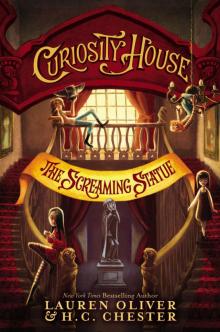 The Screaming Statue
The Screaming Statue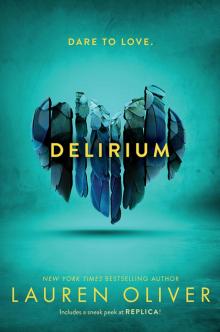 Delirium
Delirium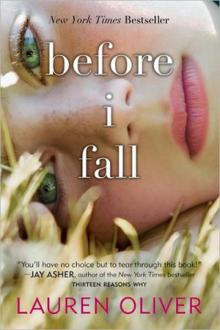 Before I Fall
Before I Fall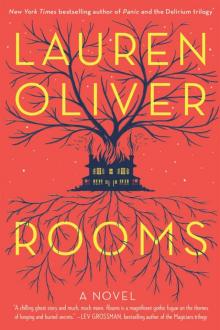 Rooms
Rooms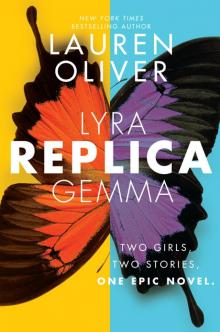 Replica
Replica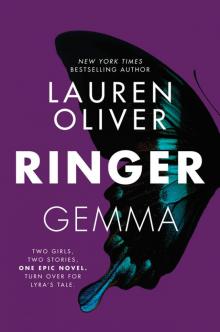 Ringer
Ringer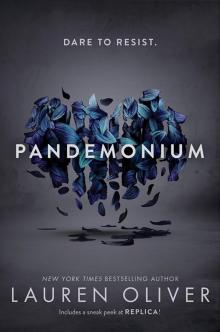 Pandemonium
Pandemonium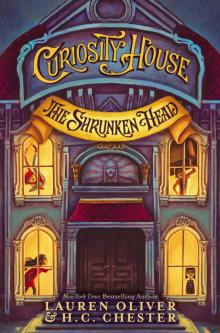 The Shrunken Head
The Shrunken Head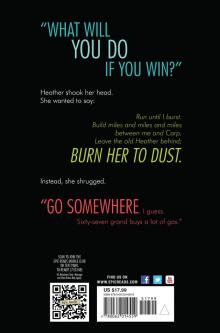 Panic
Panic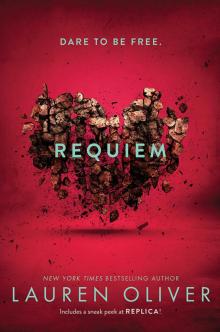 Requiem
Requiem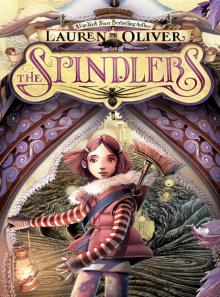 The Spindlers
The Spindlers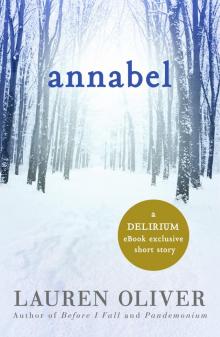 Annabel
Annabel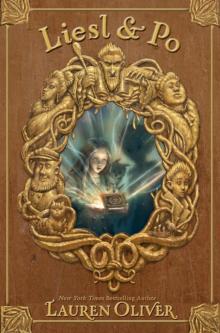 Liesl & Po
Liesl & Po Raven
Raven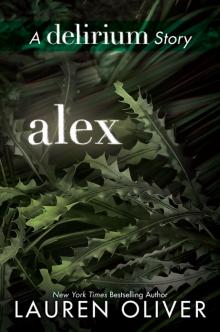 Alex
Alex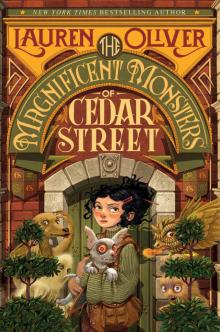 The Magnificent Monsters of Cedar Street
The Magnificent Monsters of Cedar Street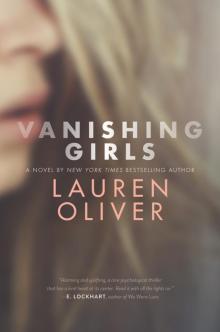 Vanishing Girls
Vanishing Girls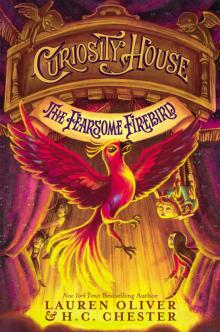 The Fearsome Firebird
The Fearsome Firebird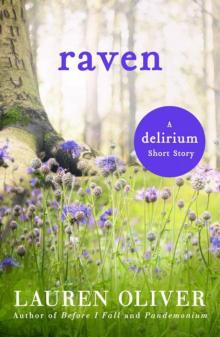 Raven: A Delirium Short Story
Raven: A Delirium Short Story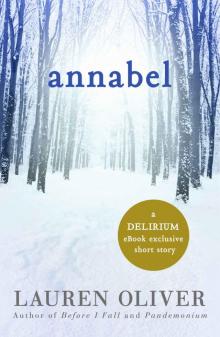 Annabel: A Delirium Short Story
Annabel: A Delirium Short Story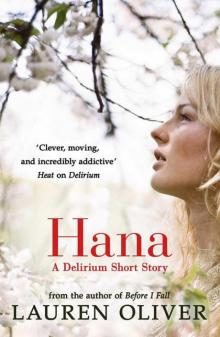 Hana: A Delirium Short Story
Hana: A Delirium Short Story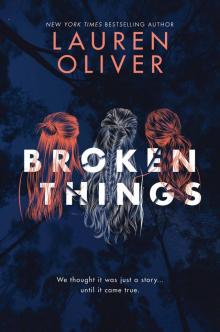 Broken Things
Broken Things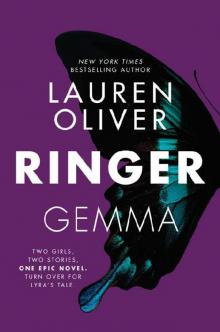 Ringer (Replica)
Ringer (Replica) Alex (delirium)
Alex (delirium)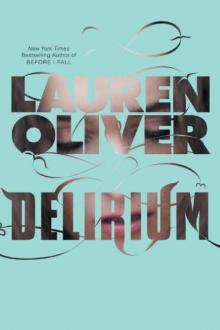 Delirium dt-1
Delirium dt-1